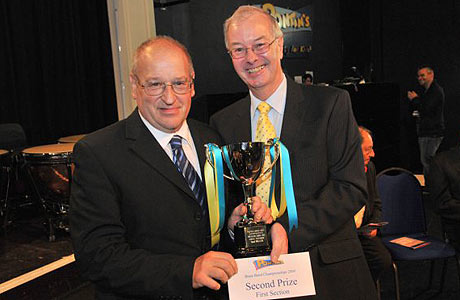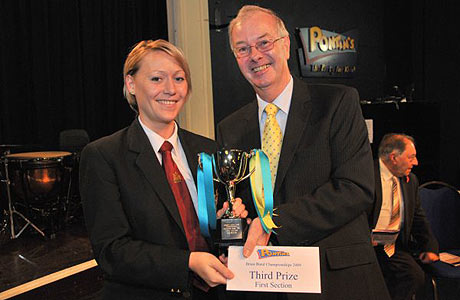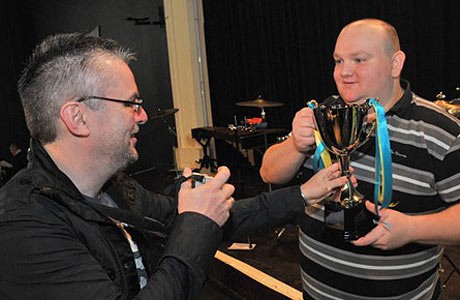2009 Pontins Championship - First Section retrospective
28-Oct-2009There is a difference between First Section in name and Championship Section in performance - and Blackburn & Darwen showed it only to well in victory.

Things are looking up: Blackburn & Darwen celebrate their win
Sand, sea and 'Symphony of Marches'.
Blackburn & Darwen made it a holiday camp double on the weekend, adding the Pontins title to the one they won at Butlins in January.
One of the best
And as a performance of confidence, control and cultured playing, it was one of the best in taking a National First Section title as you were ever likely to hear too: This was a band that on this evidence will make the step up in class to championship status with few deep seated anxieties.
In a contest that had clearly defined strata’s of competence, Blackburn were pushed hard by a brace of impressively delivered performances from Point of Ayr, and Wakefeld Metropolitan, and a pair of colourfully inconsistent ones from Longridge and Gresley Colliery.
Well matched
Behind these came a group of six well matched but flawed renditions, followed by a bottom group that struggled to varying degrees in overcoming the basic problems posed by Vinter’s somewhat neglected work.
That all the performances fell into these defined groupings was no surprise, given the almost forensic approach to the adjudication task undertaken by Peter Roberts and Stan Lippeatt: No band could have the slightest cause for complaint of where they came after hearing what these experienced performers had to say prior to the results.
Homework
Pete had certainly done his homework: It may not have been the most scintillating stand up performance he has ever produced at a brass band contest, but it was certainly one of the most comprehensive.
His carefully illuminated remarks covered every aspect of each movement of the work – no stone left unturned. He knew what he wanted to hear and he made sure everyone else knew too. It was excellent stuff.
Stan was therefore left to add the telling embellishment – something he did with a nice dry line in humour but gimlet eye for the honesty.
Congratulations
He congratulated the soprano soloists, but also ensured that despite the bravura efforts they were made aware that the marking on their solo in the middle section was marked sweetly as well as brightly: “We heard lots of confident playing today,” he remarked, before adding the barb, “…but perhaps not too much sweet playing.”
He also made the point about volume too – not sound. “The bands we rewarded,” he said, “were the ones who took risks with the dynamic scale. “Some,” he added, “…nearly pinned us to the back of the car park at times.”
Clear winners
There were no such problems with the winners – clear winners at that.
The control came directly from the MD. Nick Sheppard has a minimalist style of baton work, but one that brings with it a sense of calm authority. His band responded in kind (although not the trombone payer who nearly broke his neck with his comedy Norman Wisdom falling down act as the band took to the stage).
An opening movement of brilliance and clarity made way for a middle section that had a dark swagger, enhanced by a top notch soprano and excellent ensemble control. The Brioso finale was just that, cultured and controlled with an appreciation of style and tempo, whilst the last few bars were played with a stamp of quality from a band on tip top form.

Power point: The Welsh band takes the runner up spot
Picture: John Stirzaker
Mixed bag
Up until then we had heard a mixed old bag of efforts from the first 10 contenders.
Lindley opened the contest with a fair marker that had its moments under the baton of Jim Davies. It never quite became the sum of it parts though – at times threatening to become cohesively impressive, at others, nervously on the brink of collapse.
Mind you, having only 57 people in the hall to listen couldn’t have been a boost to their morale either.
So too Bedworth who followed. The lack of dynamic contrast and texture stood out in a hard blown performance that at times almost captured the dark wit of the writing, but all too often missed it by a considerable margin.
Things did improve somewhat with Old Silkstone: Scrappy ensemble and lack of dynamic contrast, plus a strange decision by the MD to wallow in the euphonium solo in the last movement lost them crucial momentum, just when the performance was hitting form.
Onwards and upwards
It was onwards and upwards for the following hour though as Gresley, Longridge, and Stocksbridge produced pretty good accounts.
In the end it was Mike Cotter’s ‘Symphony’, full of colourfully defined character with Longridge that impressed most in the box. The error count was a high one for sure, but the emphasis on capturing the style of the music was admirable and fourth place well deserved.
The same could also be said of Gresley too, with a compact, confident account under Simon Jones that was always controlled and musically shaped despite the noticeable unforced errors.
Stocksbridge too had their moments (and had Geoff Hawley playing sop on bumper up – so they had two fine sops for the price of one) and although it became dynamically monotone by its conclusion the basics to get it into the top six were all in place.

Third spot for Wakefield Metropolitan
Picture: John Stirzaker
Best of the rest
Tyldesley were the best of the rest that followed. A young band conducted with understanding by Rob Taylor, they battled through from start to finish with all the basic elements in place. It just didn’t have that ability to add a touch of extra polish, but there was evidence of a good band in the making by its close.
From Chalford down it became increasingly obvious that Vinter’s work was causing no end of problems.
These were performances of such varying inconsistency that Peter and Stan would have had one heck of a job debating the merits of one against another.
Style
The main problem apart from getting the basics of true First Section competency in place, was that of style – a major fault that lay on the doorstep of the men in the middle.
Much of ‘Symphony of Marches’ is repetitive with the subtlety in the dynamics, tempi and style. Forget the playing of the notes on the stave, it was the written instructions above and below that caused major headaches.
The main motif tune for instance in the final movement returns time and again, sometimes obliquely at others as the full monty - the ability to differentiate between ‘Jubilante’, Pesante’ and ‘Maestoso’ was therefore crucial in giving a sense of character to the music.
In the middle ‘Grave’ section the solo lines had to be played both with clarity and sweetness of tone, whilst the hard brilliance of the opening fanfares needed to be in contrast to the following sweet sonority of the flowing lead lines.

The price of fame: Nick Sheppard has to endure the 4BR Editor and his camera
Picture: John Stirzaker
Top three
The top three bands certainly did this – impressively so, the next pair very nearly. The following six managed to play the piece with inconsistencies of precision and style, the rest with varying degrees of mere passing acquaintance.
The serious challenge to Blackburn came at the end of the contest, with Point of Ayr's robust and taut performance holding the attention. It was powerful playing, perhaps a touch too powerful in places, but the sense of commitment, detailed ensemble work and confident soloists was impressive.
This was unpretentious playing that reflected the no nonsense approach of John Hinckley to the score. Just a lack of subtle contrasts in dynamics cost them, but it was a good one nonetheless and worthy of a podium finish.
So too Wakefield Metropolitan, who will surely relfect on a high error count as the main reason they didn't lift the Pontins trophy.
Norman Law once again showed that there are few MDs around that know the Vinter style as well as he, with a reading rich in style and nuance. If only they could rid themselvs of those unforced erros and loss of concentration, it would have been close to victory.
Chalford had the elements in the right place but somehow couldn’t bring them all together (a fine young perc section, good sop and super euph balanced by sloppy ensemble and a reluctance to really try for the dynamics).
The quartet of Drighlington, Haverhill, Brackley and Haydock would surely have been informed in bold print by the judges that they were guilty of overblowing – theirs were the main culprits in pinning the judges to the back wall of the car park.

A happy MD: Nick Sheppard with the Pontins Trophy
Pity
It was a pity as the basics of a good performance was evident in all four (especially Haverhill), but the lack of attention to dynamic detail, or perhaps appreciation of the acoustic of the hall, meant that some of the percussion work (and especially that of the side drum) almost obliterated the rest of the band.
The moments when the quality did come through (Drighlington had a fine soprano, Haverhill and Brackley played with real brio at times, Haydock’s young band started well but faded) were just not enough to push any of them higher up the table than they came or deserved.
These were First Section performances in name only.
Not so the winners – Blackburn & Darwen are now a First Section band in name only, their performance, true championship standard. Sun, sea and success then...
Iwan Fox















